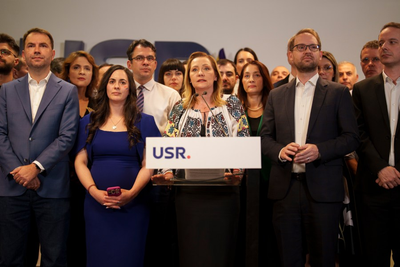
Controversy Surrounds TikTok's Role in Romanian Presidential Vote
Bucharest, Romania (AP) - TikTok has taken down several networks attempting to meddle in Romania's elections, executives said Tuesday, as they defended the company's election integrity measures to European Union lawmakers.
Context and Setup
The video-sharing platform is a focus of controversy in the Eastern European country after far-right outsider Calin Georgescu emerged as the frontrunner in the vote, plunging the country into turmoil amid allegations of electoral violations and Russian meddling. Many observers chalked up Georgescu's success to his TikTok account, which now has 5.8 million likes and 527,000 followers.
Key Points
TikTok Removes Election Meddling Networks
The company removed two small groups on Friday, days after the first round of voting, Brie Pegum, TikTok's global head of product, authenticity, and transparency, told a committee. Both networks targeted Romanian users, with one supporting Georgescu and the other different candidates.
Many experts suspect Georgescu's online following was artificially inflated while officials hinted that he was given preferential treatment by TikTok. The controversy highlights how TikTok has become a key election tool in Romania, an EU and NATO member state that shares a long border with war-torn Ukraine.
TikTok Applies Global Playbook for Romanian Election
TikTok applied its "global playbook" for the Romanian election, said Caroline Greer, the company's top lobbyist in the EU. The platform deployed 95 Romanian language content moderators, worked with a fact-checking group, and met with political parties and authorities.
Greer emphasized that TikTok took a local approach by having staff on the ground. However, many lawmakers expressed dissatisfaction with their responses, questioning what the scores of Romanian content moderators were doing during the election.
Election Integrity Measures Criticized
Lawmakers grilled TikTok executives about the company's role in the Romanian vote and compliance with the EU's Digital Services Act. Many expressed frustration with the company's responses, citing a lack of specific answers.
"The feeling here is that we are losing patience...and that we need more specific answers," said Dirk Gotink, a Dutch member of the European Parliament. He compared TikTok's executives to firefighters sent to put out a fire online during an election.
Additional Context
A report by the Bucharest-based Expert Forum think tank found that Georgescu's TikTok account garnered 92.8 million views primarily within the last few months, growing by 52 million views just days ahead of the first-round vote. Another TikTok account featuring solely Georgescu content was removed after voting.
TikTok stated that it had removed more than 150 accounts impersonating Georgescu and over 650 additional impersonation accounts belonging to other candidates. Georgescu will face reformist Elena Lasconi in a presidential runoff on Sunday.
Conclusion
TikTok's election integrity measures have been criticized by lawmakers amid controversy surrounding the company's role in Romania's presidential vote. The platform has removed several networks attempting to meddle in elections, but many remain unconvinced about its commitment to protecting users online during critical periods.
Key Takeaways
TikTok: * Removed two small groups attempting to meddle in Romanian elections * Deployed 95 Romanian language content moderators for the election * Has removed over 150 accounts impersonating Georgescu and more than 650 additional impersonation accounts belonging to other candidates * Faces criticism from lawmakers for its responses regarding election integrity measures
Context: * Romania's presidential vote is marked by controversy surrounding allegations of electoral violations and Russian meddling * TikTok has become a key election tool in Romania, an EU and NATO member state with ties to war-torn Ukraine
Recommendations for Future Coverage
Future coverage should delve deeper into the specifics of TikTok's election integrity measures and their effectiveness. The article could also explore the impact of social media on democratic processes in Eastern European countries, particularly those sharing borders with conflict zones.